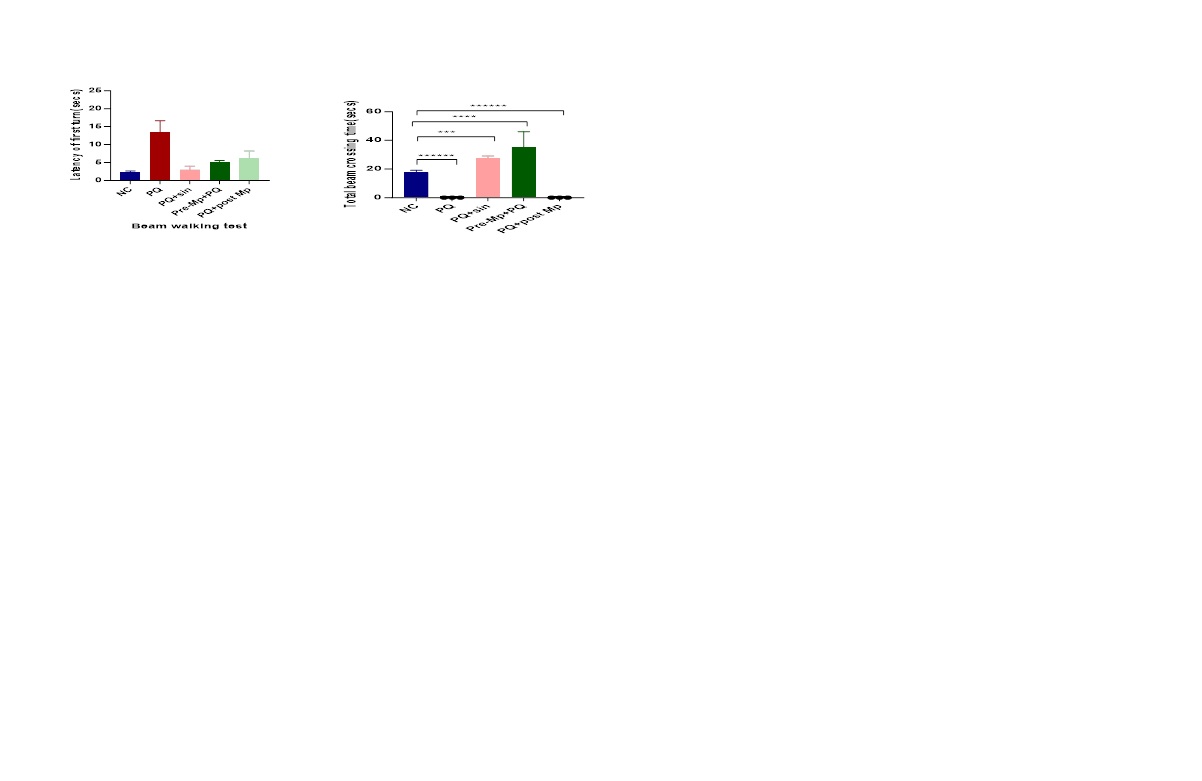Objective: Investigate neuroprotective and genoprotective effects of methanolic Mucuna pruriens (Mp) seed extract in a paraquat-induced Parkinsonism rat model.
Background: Paraquat exposure has been linked to the impairment of critical neurotransmitters and the pathogenesis of neurodegenerative diseases, including Parkinson’s disease (PD).Despite the use of levopoda in PD treatment, alternative treatments are sought due to side effects arising from long-term use. We assessed mRNA serotonin (5-HT) expression, fecal boli frequency, motor coordination, and anxiety symptoms in paraquat-exposed rats pre or post-treated with Mp seed extract.
Method: Male rats (200-230g) were divided into groups (n=7): A) negative control (10mg/kg distilled water), B) paraquat (10 mg/kg), C) paraquat(10mg/kg) + L-poda/sin(12mg/kg), D)pre-treated Mp(15mg/kg)+paraquat(10mg/kg), E) paraquat(10mg/kg)+ post Mp treatment(15mg/kg). Neurobehavioral assessments used were elevated plus maze, parallel beam, and open field tests while doses were administered p.o daily for 21 days. Pre-treatment groups received Mp doses a week before paraquat intubation; post-treatment groups received Mp doses a week after 14 days of paraquat intubation. Total RNA from rats’ basal ganglia was analyzed using real-time PCR for 5-HT and GAPDH. PCR products were electrophoresed on 1.2% agarose gel.
Results: All groups showed significant weight reductions (p<0.001) compared to the negative control. Real-time gene expression analysis revealed 5-HT depletion (p<0.0001) in the paraquat group, with higher levels in Mp pre-treated rats compared to other groups.Paraquat reduced locomotion and open arm entries in all groups, but Mp pre-treated rats exhibited increased motor coordination (p<0.01) and positive effects on the parallel beam (p<0.01) compared to paraquat and post-treated Mp groups.
Conclusion: Mp pre-treatment attenuates paraquat-induced PD symptoms, including anxiogenic responses, depleted 5-HT expression, and motor coordination, compared to post-treatment with Mp. Hence, early pharmacological intervention in PD management is promising, but safety assessments for Mp seed extract in neurodegenerative disorder treatment are crucial.
Fig 1
Fig 2
Fig 3
Fig 4
Fig 5
References: Objective: Investigate neuroprotective and genoprotective effects of methanolic Mucuna pruriens (Mp) seed extract in a paraquat-induced Parkinsonism rat model.
Background: Paraquat exposure has been linked to the impairment of critical neurotransmitters and the pathogenesis of neurodegenerative diseases, including Parkinson’s disease (PD).Despite the use of levopoda in PD treatment, alternative treatments are sought due to side effects arising from long-term use. We assessed mRNA serotonin (5-HT) expression, fecal boli frequency, motor coordination, and anxiety symptoms in paraquat-exposed rats pre or post-treated with Mp seed extract.
Methods: Male rats (200-230g) were divided into groups (n=7): A) negative control (10mg/kg distilled water), B) paraquat (10 mg/kg), C) paraquat(10mg/kg) + L-poda/sin(12mg/kg), D)pre-treated Mp(15mg/kg)+paraquat(10mg/kg), E) paraquat(10mg/kg)+ post Mp treatment(15mg/kg). Neurobehavioral assessments used were elevated plus maze, parallel beam, and open field tests while doses were administered p.o daily for 21 days. Pre-treatment groups received Mp doses a week before paraquat intubation; post-treatment groups received Mp doses a week after 14 days of paraquat intubation. Total RNA from rats’ basal ganglia was analyzed using real-time PCR for 5-HT and GAPDH. PCR products were electrophoresed on 1.2% agarose gel.
Results: All groups showed significant weight reductions (p<0.001) compared to the negative control. Real-time gene expression analysis revealed 5-HT depletion (p<0.0001) in the paraquat group, with higher levels in Mp pre-treated rats compared to other groups.Paraquat reduced locomotion and open arm entries in all groups, but Mp pre-treated rats exhibited increased motor coordination (p<0.01) and positive effects on the parallel beam (p<0.01) compared to paraquat and post-treated Mp groups.
Conclusions: Mp pre-treatment attenuates paraquat-induced PD symptoms, including anxiogenic responses, depleted 5-HT expression, and motor coordination, compared to post-treatment with Mp. Hence, early pharmacological intervention in PD management is promising, but safety assessments for Mp seed extract in neurodegenerative disorder treatment are crucial.
To cite this abstract in AMA style:
A. Obajuluwa, B. Laoye, J. Okwuaka, T. Obajuluwa, J. Lech, A. Oremosu. Pre-treatment with Methanolic Extract Mucuna pruriens Seeds Attenuates Serotonin Gene Depletion, Motor Dysfunction and Anxiogenic Responses in a Rat Model of Parkinsonism [abstract]. Mov Disord. 2024; 39 (suppl 1). https://www.mdsabstracts.org/abstract/pre-treatment-with-methanolic-extract-mucuna-pruriens-seeds-attenuates-serotonin-gene-depletion-motor-dysfunction-and-anxiogenic-responses-in-a-rat-model-of-parkinsonism/. Accessed April 18, 2025.« Back to 2024 International Congress
MDS Abstracts - https://www.mdsabstracts.org/abstract/pre-treatment-with-methanolic-extract-mucuna-pruriens-seeds-attenuates-serotonin-gene-depletion-motor-dysfunction-and-anxiogenic-responses-in-a-rat-model-of-parkinsonism/





